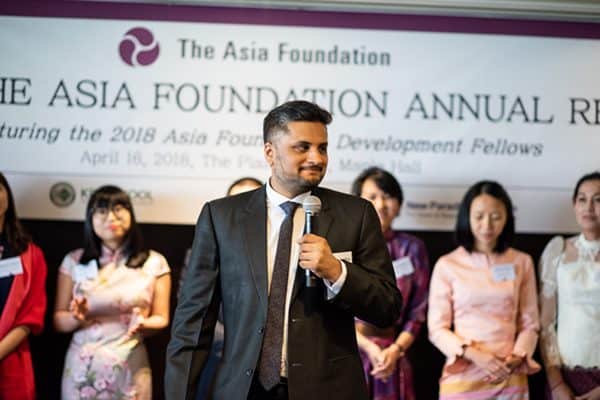Vaibhav Lodha, Founder of ftcash is a firm believer of the No Sir No Madam cause. Vaibhav is an alumnus of prestigious Kennedy School of Government, Harvard University and NIT Trichy. He was a Director, Global Development at XPRIZE, leading World’s first international award that recognizes the problems associated with access to water. He had previously worked with The World Bank advising government of India for a $1 billion project on Water Supply and Sanitation.
In 2012, Vaibhav Lodha was selected as a Davos50, Global Shapers by World Economic Forum and awarded ‘Businessworld 40 under 40’ for his work. His company, ftcash is one of India’s fastest growing financial technology companies. It empowers the 60+ million undeserved micro-merchants in India through financial inclusion using digital payments and loans.
Vaibhav encourages his juniors and team members to address him by his name. He affirms that it is important to make all the members feel comfortable, for a productive outcome, in the company. Vaibhav states, “We all like to hear our names. Hence, salutation is a cultural stigma which we should remove to build a developed society.”
During his college, Vaibhav addressed every individual in a higher position as Sir or Madam as it was the norm. However, after he joined a consulting firm, Vaibhav learned to adjust to this new idea of first-name based communication. Once he got habituated, the practice remained with him. Now, he corrects the hesitant freshers for them to adapt to the new friendly environment.
Vaibhav contemplates that the salutation culture is more prevalent in the government sectors. While working in the World Bank and Government of India, Vaibhav noticed that the officials had a normal tendency of expecting this artificial form of respect. Vaibhav proclaims that he has a fundamental problem with these dictums.
However, Vaibhav mentions that the corporate heads, executives, and even officials in the West are more comfortable in the absence of Sir and Madam pronouns. While in India, most public servants take offence, when the citizens address them by their name.
He observes that the Sir or Madam taboo can change people’s behavior and inflate one’s ego.
He had once had a brand partner for a project who did not consider the juniors in his company with equal significance. Thereafter, Vaibhav suggested that his team members could refer to the allies by their name. Soon, there was a subsequent change in the attitude of the partners as they no longer were given an upper hand.
Education is the prime factor that can mold minds. In one of the schools in Rajasthan, Vaibhav witnessed an open culture. The teachers sat in a circular table with the students. In fact, like students, the teachers had to wait outside the class, if they were late. Hence, it seemed that positive actions and stronger bonding can create better relationship between students and teachers.
Vaibhav believes that the environment determines the growth of a person. We should create an equal platform for everyone so that every profession gains respect. We ought to educate the people in lower stratus and change their conditioned minds.
In conclusion, Vaibhav recommends, “Every person should honestly do his or her part as change begins at the micro level and then gradually spreads.”







Add comment